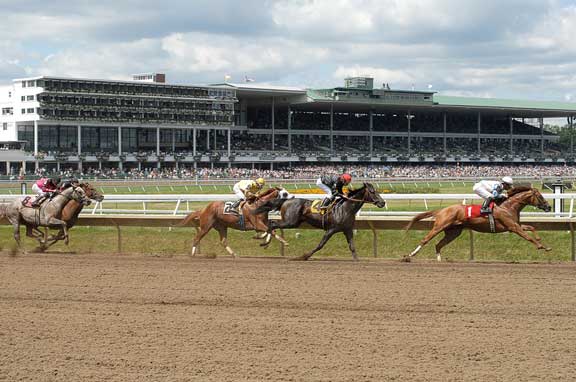By Bill Finley
The Supreme Court agreed Tuesday to hear the long-running case that pits the State of New Jersey against the four main professional sports leagues and the NCAA over the legality of sports betting.
Though the court's latest move is by no means a guarantee that it will rule in favor of the state, the mere announcement that it would hear the case was seen as a major victory for the pro-sports betting side. It was also somewhat of a surprise as in May, Acting U.S. Solicitor General Jeffrey Wall advised the court that there was no need for the justices to hear the case.
“When I heard the news I was very happy,” said Dennis Drazin, who heads the management team at Monmouth Park and has been one of the driving forces behind the push to legalize sports betting in the state. “It was unexpected. Yesterday, I would have told you that this was a longshot for us. The Solicitor General came in and said 'don't take the case' and that was a blow we did not expect. I am very happy that the court has decided to grant certiorari. I think this moves us up substantially in terms of the likelihood that sports betting will be permitted.”
New Jersey voters and the state legislature have approved a partial repeal of the Professional and Amateur Sports Protection Act (PASPA) that would allow sports betting at the state's casinos, operating racetracks and defunct racetracks. However, the sports leagues successfully fought back in the courts and looked to have won out on the issue until the Supreme Court decided to take the case.
Drazin is optimistic that the court taking the case against the advice of the Solicitor General is a sign that it will rule in favor of the legalization of sports betting.
“I don't think they would grant cert just to hand us a loss down the road,” he said. “Granting cert, to me, means the likelihood is that we will prevail on the merits”
New Jersey's politicians, racing leaders and casino executives have come together in an effort to legalize sports betting with both the casino and racing industries struggling. The Atlantic City casinos have been hurt by the proliferation of gaming in the Mid-Atlantic states–Pennsylvania in particular–and Monmouth is having a hard time competing against tracks with purses that are fueled by casino and slot profits. New Jersey is the only state in the region that does not benefit from gaming revenue.
Drazin estimates that $10 billion would be bet annually in the state on sports.
“The Professional and Amateur Sports Protection Act (PASPA) of 1992 has failed to protect sports and fans,” American Gaming Association President and CEO Geoff Freeman said in a statement Tuesday. “PASPA, which is approaching its 25th anniversary, is fueling an unregulated $150 billion illegal gambling market that continues to deprive states of vital public funding for services such as law enforcement and infrastructure. We are pleased the Supreme Court appears to have responded favorably to our arguments as to why they should hear this important case. And we are hopeful their engagement will provide further encouragement for Congress to take the steps necessary to create a regulated sports betting marketplace in the United States.”
The case is expected to be heard some time this fall, with a verdict being announced in the early months of 2018.
“The fact that the Supreme Court granted cert in this case is a very good sign for sports betting having a future in New Jersey,” governor Chris Christie said at a press conference Tuesday. “I'm encouraged by it. We're not declaring victory, but at least we're in the game, and that's where we want to be.”
Should the Supreme Court rule in New Jersey's favor, it is unclear how that will affect other states and the racing industry. There's little doubt that other states will be watching the outcome closely and will push for legalized sports betting, as well, should New Jersey prevail. How they must go about it and what they can and cannot do may remain open to interpretation. One possible scenario is that the court fully repeals PASPA, which could make sports betting legal at places other than just racetracks and casinos.
When asked for comment, NTRA President and CEO Alex Waldrop kept the focus on Monmouth Park.
“The decision was a welcome surprise for Monmouth Park, given that the U.S. Solicitor General had recommended against granting cert in this case,” he said. “Admittedly, this case is unlikely to create anything more than a narrow exception for state deregulation of sports betting, but a favorable ruling from the court would be good news for Monmouth Park nonetheless.”
The case largely revolves around states' rights issues, in particular where the line should be drawn when it comes to states making their own laws versus having to adhere to federal laws.
Not a subscriber? Click here to sign up for the daily PDF or alerts.






